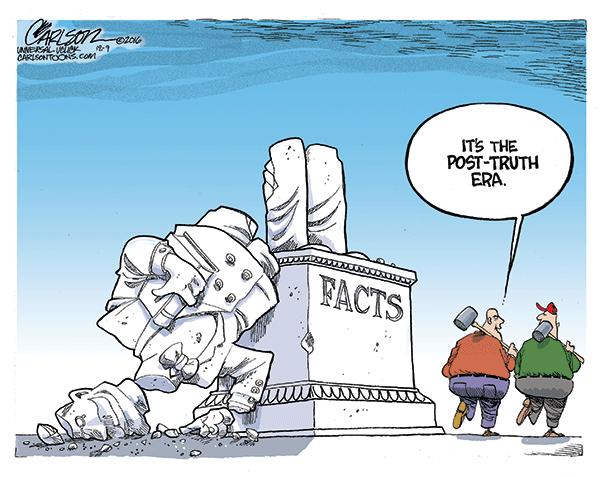Will vloggers take over ‘real’ journalists soon?
Are we really in the time when vloggers should take over journalism?
Popular vlogs could trace their origins to YouTube’s birth in 2005. With millions broadcasted on social media every single day, it’s no wonder people are addicted to this easily digestible content.
It’s easy to see how vloggers managed to build and cultivate a huge audience. Vlogging is more personal, more freeing in terms of topic and runtime. Everything is more “human” and “real,” and people nowadays are suckers for anything that screams authenticity.
A cultural phenomenon, vlogging has since grown from vids about “Day in the Life” into social issues and politics, challenging the notion of how we consume our news.
This massive growth has shaken traditional media to its core. It begs questions like, “Do vloggers have a place in journalism? Can content creators be equal to journos? Is this the industry’s future?

We are currently living in a post-truth era
Oxford Dictionaries defines the term “post-truth” as personal beliefs are more influential than objective facts. In short, people can be convinced by whatever they see as long as they feel it is right.
Fueled by the rise of social media as a news source, the post-truth era reduces trust in journalists. With the journalists’ “accusations” and fact-checking which people believed to be politically “biased,” the public turned to vloggers as a “credible” source.
With baseless beliefs and subjective opinions given a higher priority than verifiable facts, unsupported beliefs have taken precedent over readily identifiable truths in discussions and discourses.
In an era of lies and delusion, it is no wonder that the space for trained and professional journalists providing vetted information continues to shrink.
Upholding transparency and press freedom under a Marcos rule
Vloggers are among those who have been trailing every move of Ferdinand “Bongbong” Marcos Jr., the son of a dictator and the president-elect of the Republic of the Philippines.
Known to hide and even block professional journalists who cover him, his camp gives preferential treatment to vloggers, influencers, and the infamous Sonshine Media Network International.
Marcos is undoubtedly and consistently hard to interview. Here's some proof on film. Everyone embedded in this campaign will say the same. https://t.co/kqn2SgHYbU pic.twitter.com/LTjvoVu0aO
— Lian Buan (@lianbuan) April 26, 2022
These restrictive actions against journalists have sparked fear of how independent media would be treated under the Marcos regime.
Democratizing access to the government may be commendable in principle, but it also raises questions of independence and accountability. It also raised the question of upholding transparency and press freedom since the vloggers who may likely benefit from this access would be the pro-Marcos vloggers.
Where do we draw the line?
With the post-truth era and the public’s mounting mistrust, the question should also be on how journalists can adapt.
The internet assured the inevitable democratization of content creation. However, it must be looked at with nuance.
Both vloggers and journalists present information to the public. They both tackle issues with the goal to inform and influence public opinion. The strictest of journalists would hate to admit it, but there is a multitude of reasons why vlogging appeals so strongly to the public.
Vlogging is considered one of the fastest ways to disseminate information online. Vloggers being content producers do their research to provide quality content.
Vloggers differ from journalists by their way of presenting perspectives in an understandable and accessible take to a wider reach. Accountability is somewhat present, as vloggers aren’t immune to threats of libel.
But while we’re in an era of advent change, vloggers should not attempt to equate themselves to journalists.
First, the dangers that journalists face are on another level. Journalists can be killed, and even red-tagged by just reporting to the public. More so, they are continuously being challenged in establishing their credibility as false information spreads easily and rapidly.
Second, journalists are trained to publish reports with rigor. Journalists are trained to bring fairness and objectivity, to look for sources firsthand to lay bare issues relevant to the public.
Accrediting vloggers to cover events of the new administration would open doors for the subjection of press freedom as numerous content creators have no sense of accountability. Pro-Marcos vloggers, who are known for valuing leverage more than accuracy, might help in spreading disinformation, or worse, in making what seems “true” true.
Instead, vloggers should aim to be more complementary to journalists in breaking down content to a wider audience. After all, it is still the journalist’s job to publish reports deemed important to the public.
Traditional media outright dismissing the digital side is bordering on delusion. More than ever, this vlogging phenomenon might be an opportunity to capitalize on the new way people consume content.
The post <b> Will vloggers take over ‘real’ journalists soon? </b> appeared first on WE THE PVBLIC.
Source: we the pvblic
No comments